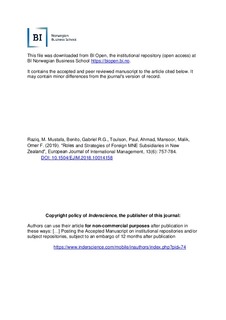Roles and strategies of foreign MNE subsidiaries in New Zealand
Journal article, Peer reviewed
Accepted version
Permanent lenke
http://hdl.handle.net/11250/2635369Utgivelsesdato
2019Metadata
Vis full innførselSamlinger
- Publikasjoner fra CRIStin - BI [1015]
- Scientific articles [2181]
Originalversjon
European Journal of International Management. 2019, 13 (6), 757-784. 10.1504/EJIM.2018.10014158Sammendrag
This study examines the roles and strategies of foreign-owned subsidiaries in New Zealand, with the aim to develop an improved classification of subsidiaries of multinational enterprises (MNE). Previous research has proposed a range of subsidiary classifications indicating various ways in which subsidiaries can be distinguished. There are, however, still concerns that critical contingencies, such as the subsidiary development capacity and its own strategy, remain ignored. This study addresses these gaps by drawing on network theory to develop a novel and overarching subsidiary classification framework. Based on the framework, it empirically derives a three-part subsidiary classification: entrepreneurial, constrained autonomous, and constrained. The empirical classification is based on data from 429 foreign subsidiaries in New Zealand. Implications for theory, public policy, and management practice are made.
